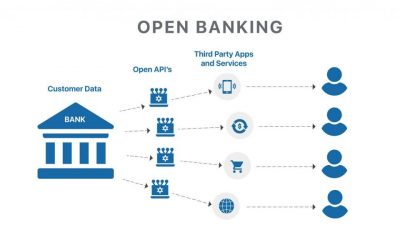Economy
Driving Fintech Success in Nigeria: A Deep Dive into Growth Marketing Strategies with Okwuchukwu Udeh

Okwuchukwu Udeh is a product and growth expert with about a decade of experience in the financial industry and has significantly contributed to leading traditional and disruptive financial organisations in the country, including Lloyds Banking Group in the UK. She strongly focuses on leveraging technology for financial inclusion and has guided fintech startups, including digital banks, towards sustainable growth and market success. Okwuchukwu shares her expertise through thought leadership pieces tailored for growth marketers and industry stakeholders. She also participates in talk shows to amplify discussions on pertinent industry topics. Her active participation in digital tech events reflects her dedication to inspiring the next generation of fintech innovators, both locally and globally.
Excerpts.
Can you elaborate on the unique characteristics of the Nigerian market that fintech startups should consider when formulating their growth marketing strategies?
The Nigerian market’s unique characteristics present both opportunities and challenges for fintech startups. With over 200 million people, Nigeria provides a vast and untapped market for financial innovation. However, it is crucial to consider the impact of economic disparities and cultural dynamics on consumer behaviour.
Nigerians rely heavily on peer recommendations and community validation, meaning social proof is essential in their decision-making process. Therefore, fintech startups should use user testimonials, ratings, and reviews to establish trust and credibility among their Nigerian consumers.
Also, Nigerian consumers are known for their price sensitivity and preference for convenience. Many are hesitant to adopt new financial technologies if they are expensive or cumbersome to use. So, fintech startups should tailor their marketing strategies to offer affordable solutions that prioritise simplicity and accessibility, aligning with the consumers’ preferences.
I believe Fintech startups can develop effective growth marketing strategies that resonate with their target market by leveraging these unique characteristics, fostering long-term success.
In your experience, what role do digital channels play in driving growth for fintech startups in Nigeria?
Digital channels are indispensable for fintech startups seeking to effectively reach and engage Nigerian consumers. These channels significantly influence growth marketing within the country’s fintech ecosystem. Social media platforms such as Facebook, Twitter, TikTok, and Instagram are viral among Nigerians, who spend many hours daily engaging with content and connecting with peers.
Fintech startups can use these platforms to disseminate targeted messaging, engage with potential customers, and drive conversions. However, it is important to understand the cultural nuances of each platform and create relevant content that resonates with Nigerian audiences. For instance, humorous and culturally relevant content usually performs better on social media in Nigeria, building deeper connections with users.
What about influencer marketing? It has gained traction in recent years. What are some practical ways fintech startups can harness the power of influencers in Nigeria?
Oh yes! Influencer marketing is a powerful opportunity for fintech startups in Nigeria to increase their brand visibility and reach a larger audience. In a market where trust and credibility are crucial, collaborating with influencers who have established genuine connections with their followers can significantly improve a fintech startup’s credibility and engagement.
One effective way fintech startups can harness the power of influencers in Nigeria is by carefully selecting influencers whose values and audience demographics align with their target market. Rather than focusing solely on influencers with the largest following, startups should prioritise those with a genuine interest in finance and technology and who resonate with their target audience. For instance, collaborating with influencers specialising in personal finance, budgeting tips, or investment advice can help fintech startups operating in those areas establish credibility and relevance among their target audience.
Additionally, Fintech startups should focus on authenticity and transparency when collaborating with influencers. By encouraging influencers to share their genuine experiences with the fintech product or service, startups can establish trust with their audience and create a stronger bond. Also, partnering with influencers to offer exclusive promotions or discounts can motivate their followers to take action and boost conversions.
One other effective way that fintech startups can leverage the power of influencers is to use influencer-generated content across various channels to achieve maximum impact and reach. They can do this via sponsored posts, video testimonials, or live demonstrations. By repurposing influencer content, fintech brands can expand their reach and reinforce their key messaging among different audience segments.
Mobile optimisation is crucial in a market like Nigeria, where mobile usage surpasses traditional desktop access. How can fintech startups ensure effective mobile marketing?
Optimising for mobile is imperative for fintech startups that want to capture the Nigerian market. Due to the widespread availability of affordable smartphones and internet access, mobile devices have become the primary means of accessing digital services in Nigeria. Therefore, fintech startups must ensure that their websites and apps are mobile-friendly and optimised for slow internet connections and varying screen sizes. For instance, adopting a Progressive Web App (PWA) approach can offer a smooth mobile experience to users, even in low-bandwidth situations. Additionally, using mobile-first ad placements on social media platforms such as Instagram can increase visibility and engagement among mobile users in Nigeria.
Building trust and credibility is paramount in the financial sector. How can fintech startups establish trust with Nigerian consumers?
Thank you for asking me that question. Trust is foundational in finance, especially in emerging markets like Nigeria. Building trust is a crucial aspect of growth for fintech startups in Nigeria. It involves being transparent, reliable, and responsive in multiple ways. To gain trust, fintech startups should deliver on their promises. They should clearly communicate fees, offer transparent pricing and clear terms and conditions, and provide excellent customer service and responsive customer support. Also, creating a culture of openness and accountability both internally and externally can reinforce trust and credibility with the company’s target audience.
Furthermore, fintech startups can establish trust by leveraging local partnerships and affiliations with reputable financial institutions. For instance, partnering with well-known banks or payment processors can lend credibility to a fintech startup’s brand and reassure consumers about the safety and security of their financial transactions. But ultimately, gaining trust requires consistent actions and a demonstrated commitment to meeting user needs and expectations.
Lastly, how can fintech startups leverage data-driven insights to refine their growth marketing strategies in Nigeria?
Hmmm. Data is the lifeblood of effective growth marketing. In Nigeria, where consumer behaviour can vary significantly across regions and demographics, data-driven insights are invaluable for understanding market trends and optimising marketing strategies accordingly. For example, digital bank startups can analyse user engagement metrics on their mobile app to identify patterns and preferences among Nigerian users. This allows them to personalise messaging and promotions for maximum impact.
Also, predictive analytics can help fintech startups anticipate customer needs and personalise marketing campaigns to drive conversions. In essence, adopting a data-driven approach enables fintech startups to stay agile in Nigeria’s dynamic market, driving sustainable growth and fostering long-term customer relationships.
What advice would you give to fintech startups that want to grow rapidly in Nigeria’s competitive market?
I recommend embracing agility, innovation, and a relentless focus on the customer. Success in Nigeria’s fintech market requires staying ahead of the curve, anticipating trends, and adapting quickly to changing consumer preferences. I’d also advise fintech startups to cultivate a culture of experimentation and learning, where failures are seen as opportunities for growth and improvement. By staying true to their mission, values, and vision, fintech startups can create a distinct competitive advantage for themselves and drive sustainable development in Nigeria’s dynamic fintech ecosystem.
Economy
Why Transparency Matters in Your Choice of a Financial Broker

Choosing a Forex broker is essentially picking a partner to hold the wallet. In 2026, the market is flooded with flashy ads promising massive leverage and “zero fees,” but most of that is just noise. Real transparency is becoming a rare commodity. It isn’t just a corporate buzzword; it’s the only way a trader can be sure they aren’t playing against a stacked deck. If a broker’s operations are a black box, the trader is flying blind, which is a guaranteed way to blow an account.
The Scam of “Zero Commissions”
The first place transparency falls apart is in the pricing. Many brokers scream about “zero commissions” to get people through the door, but they aren’t running a charity. If they aren’t charging a flat fee, they are almost certainly hiding their profit in bloated spreads or “slippage.” A trader might hit buy at one price and get filled at a significantly worse one without any explanation. This acts as a silent tax on every trade. A transparent broker doesn’t hide the bill; they provide a live, auditable breakdown of costs so the trader can actually calculate their edge.
The Conflict of Market Making
It is vital to know who is on the other side of the screen. Many brokers act as “Market Makers,” which is a polite way of saying they win when the trader loses. This creates a massive conflict of interest. There is little incentive for a broker to provide fast execution if a client’s profit hurts their own bottom line. A broker with nothing to hide is open about using an ECN or STP model, simply passing orders to the big banks and taking a small, visible fee. If a broker refuses to disclose their execution model, they are likely betting against their own clients.
Regulation as a Safety Net
Transparency is worthless without an actual watchdog. A broker that values its reputation leads with its licenses from heavy-hitters like the FCA or ASIC. They don’t bury their regulatory status in the fine print or hide behind “offshore” jurisdictions with zero oversight. More importantly, they provide proof that client funds are kept in segregated accounts. This ensures that if the broker goes bust, the money doesn’t go to their creditors—it stays with the trader. Without this level of openness, capital is essentially unprotected.
The Withdrawal Litmus Test
The ultimate test of a broker’s transparency is how they handle the exit. There are countless horror stories of traders growing an account only to find that “technical errors” or vague “bonus terms” prevent them from withdrawing their money. A legitimate broker has clear, public rules for getting funds out and doesn’t hide behind a wall of unreturned emails. If a platform makes it difficult to see the exit strategy, it’s a sign that the front door should have stayed closed.
Conclusion
In 2026, honesty is the most valuable feature a broker can offer. It is the foundation that allows a trader to focus on the charts instead of worrying if their stops are being hunted. Finding a partner with clear pricing, honest execution, and real regulation is the first trade that has to be won. Flashy marketing is easy to find, but transparency is what actually keeps a trader in the game for the long haul.
Economy
Nigeria’s Stock Market Indices Shrink 0.41% Amid Panic Sell-Offs

By Dipo Olowookere
The Nigerian Exchange (NGX) Limited came under panic sell-offs on Thursday, as the investing community awaits the outcome of a probe into trading activities around one of the stocks on the bourse.
On Monday, trading in Zichis equities was prohibited by the regulator after it gained almost 900 per cent in one month of being listed by introduction on the growth board of the exchange.
This action triggered cautious trading on Customs Street, and things have not remained the same since then.
Yesterday, the key performance indices of the Nigerian bourse further depreciated by 0.41 per cent, the third straight loss this week, as investors book profit before being trapped.
It was observed that the energy industry gained 0.12 per cent and was the only one in green, as the industrial goods space shed 1.19 per cent, the banking counter depreciated by 0.63 per cent, the insurance sector lost 0.32 per cent, and the consumer goods segment tumbled by 0.03 per cent.
As a result, the All-Share Index (ASI) contracted by 802.39 points to 193,567.81 points from 194,370.20 points, and the market capitalisation decreased by N515 billion to N124.239 trillion from N124.754 trillion.
During the session, investors traded 868.5 million shares worth N31.5 billion in 69,310 deals compared with the 1.4 billion shares valued at N46.2 billion exchanged in 70,222 deals at midweek, showing a drop in the trading volume, value, and number of deals by 37.96 per cent, 31.82 per cent, and 1.30 per cent, respectively.
Jaiz Bank led the activity chart with 78.9 million equities valued at N1.2 billion, Japaul traded 73.3 million stocks worth N274.8 million, Access Holdings exchanged 66.9 million shares for N1.7 billion, Chams sold 56.9 million equities worth N239.6 million, and Zenith Bank transacted 45.5 million stocks valued at N4.1 billion.
The worst-performing stock for the day was Jaiz Bank after it lost 9.98 per cent to trade at N12.63, Ikeja Hotel declined by 9.90 per cent to N37.75, John Holt shrank by 9.90 per cent to N8.65, Enamelware slipped by 9.88 per cent to N36.50, and Cadbury went down by 9.69 per cent to N61.95.
On the flip side, FTN Cocoa was the best-performing stock after it gained 10.00 per cent to sell for N6.05, RT Briscoe improved by 9.95 per cent to N11.38, Deap Capital soared 9.92 per cent to N6.98, Japaul grew by 9.91 per cent to N3.77, and Ellah Lakes surged 9.72 per cent to N11.85.
Investor sentiment remained bearish as the exchange finished with 30 price gainers and 38 price losers, implying a negative market breadth index.
Economy
Champion Breweries Concludes Bullet Brand Portfolio Acquisition

By Aduragbemi Omiyale
The acquisition of the Bullet brand portfolio from Sun Mark has been completed by Champion Breweries Plc, a statement from the company confirms.
This marks a transformative milestone in the organisation’s strategic expansion into a diversified, pan-African beverage platform.
With this development, Champion Breweries now owns the Bullet brand assets, trademarks, formulations, and commercial rights globally through an asset carve-out structure.
The assets are held in a newly incorporated entity in the Netherlands, in which Champion Breweries holds a majority interest, while Vinar N.V., the majority shareholder of Sun Mark, retains a minority stake.
Bullet products are currently distributed in 14 African markets, positioning Champion Breweries to scale beyond Nigeria in the high-growth ready-to-drink (RTD) alcoholic and energy drink segments.
This expansion significantly broadens the brewer’s addressable market and strengthens its revenue base with an established, profitable portfolio that already enjoys strong brand recognition and consumer loyalty across multiple markets.
“The successful completion of our public equity raises, together with the formal close of the Bullet acquisition, marks a defining moment for Champion Breweries.
“The support we received from both existing shareholders and new investors reflects strong confidence in our long-term strategy to build a diversified, high-growth beverage platform with pan-African scale.
“Our focus now is on disciplined execution, integration, and delivering sustained value across markets,” the chairman of Champion Breweries, Mr Imo-Abasi Jacob, stated.
Through this transaction, Champion Breweries is expected to achieve enhanced foreign exchange earnings, expanded distribution leverage across African markets, integrated supply chain efficiencies, portfolio diversification into high‑growth consumer beverage categories, and strengthened presence in the RTD and energy drink segments.
The acquisition accelerates Champion Breweries’ transition from a regional brewing business to a multi-category consumer platform with continental reach.
Bullet Black is Nigeria’s leading ready-to-drink alcoholic beverage, while Bullet Blue has built a strong presence in the energy drink category across several African markets.
-

 Feature/OPED6 years ago
Feature/OPED6 years agoDavos was Different this year
-
Travel/Tourism10 years ago
Lagos Seals Western Lodge Hotel In Ikorodu
-

 Showbiz3 years ago
Showbiz3 years agoEstranged Lover Releases Videos of Empress Njamah Bathing
-

 Banking8 years ago
Banking8 years agoSort Codes of GTBank Branches in Nigeria
-

 Economy3 years ago
Economy3 years agoSubsidy Removal: CNG at N130 Per Litre Cheaper Than Petrol—IPMAN
-

 Banking3 years ago
Banking3 years agoSort Codes of UBA Branches in Nigeria
-

 Banking3 years ago
Banking3 years agoFirst Bank Announces Planned Downtime
-

 Sports3 years ago
Sports3 years agoHighest Paid Nigerian Footballer – How Much Do Nigerian Footballers Earn



















